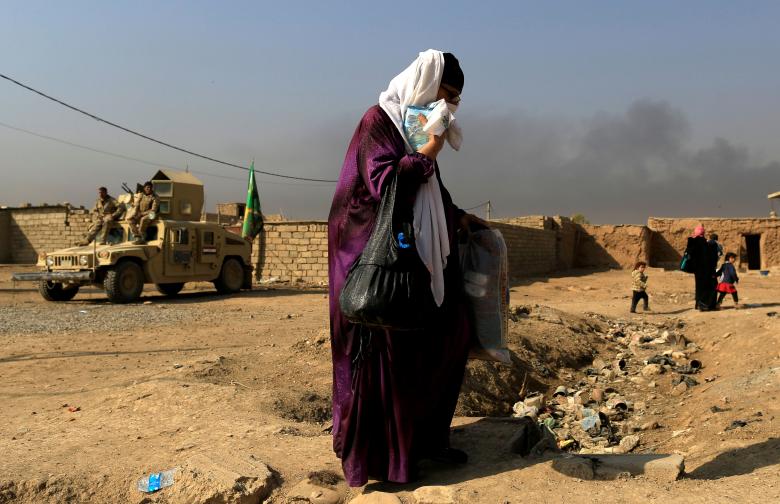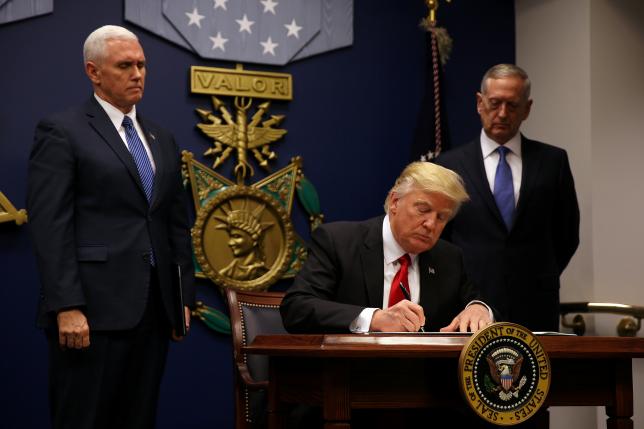Trump refugee order dashes hopes of Iraqis who helped the US
 A woman who is fleeing the fighting between Islamic State and the Iraqi army in the Intisar district of eastern Mosul, walks past a military humvee while heading to safer territory in Iraq November 7, 2016. (Photo: Reuters/File Photo)
A woman who is fleeing the fighting between Islamic State and the Iraqi army in the Intisar district of eastern Mosul, walks past a military humvee while heading to safer territory in Iraq November 7, 2016. (Photo: Reuters/File Photo) NEW YORK – Iraqis who say their lives are in danger because they worked with the US government in Iraq fear their chances of finding refuge in the United States may vanish under a new order signed by President Donald Trump.
The order temporarily suspends the United States’ main refugee program and halts visas being issued to citizens of several predominantly Muslim countries, including Iraq. It is expected to affect two programs US lawmakers created a few years after the 2003 invasion of Iraq to help the tens of thousands of Iraqis who risked their lives helping Americans.
Trump says the order is necessary to prevent Islamist militants from coming to the United States posing as refugees, but refugee advocacy groups say the lengthy screening of applicants by multiple U.S. agencies makes this fear unfounded.
Iraqis coming to the United States under the Special Immigrant Visa program for Iraqis, which stopped accepting new applications in 2014, or the ongoing Direct Access Program for U.S.-Affiliated Iraqis are losing hope of ever getting out.
“Mr. Trump, the new president, killed our dreams,” said one Baghdad man whose wife worked for the United States Agency for International Development (USAID) as a bookkeeper.
“I don’t have any hope to go to the United States,” he said in a telephone interview, speaking on condition of anonymity for fear of retribution by Iraq’s Sunni and Shia militant groups and also of unfavorable treatment by the Trump administration.

US President Donald Trump signs an executive order he said would impose tighter vetting to prevent foreign terrorists from entering the United States at the Pentagon in Washington, US, January 27, 2017. (Photo: Reuters)
More than 7,000 Iraqis, many of them interpreters for the US military, have resettled in the United States under the Special Immigrant Visa program since 2008, while another 500 or so are still being processed, according to State Department figures. Another 58,000 Iraqis were awaiting interviews under the Direct Access program, according to the International Refugee Assistance Project. Tens of thousands have already arrived under the second program, but no recent total was available.
“A lot of translators were trying to get the hell out of there because they had a mark on their head for working with US forces,” Allen Vaught, a former US Army captain who went to Fallujah in western Iraq in 2003, said in a telephone interview. “They’re viewed as collaborators.”
He fears the order would endanger American troops by making it harder to recruit local support in war zones, a belief echoed by several advocacy groups working on behalf of America’s Iraqi employees.
While in Iraq, Vaught employed five local interpreters who initially earned $US5 a week traveling with troops, sometimes without weapons or armor. He helped two of the interpreters come to the United States as refugees with their families, putting them up initially in his home in Dallas, Texas. Another two were executed by militia groups, he said.
The fifth was still mired in the refugee screening process, which can last months or years even after the initial interview. Vaught had expected to also welcome him into his home this year before he had seen a draft of Trump’s order.
“This executive order is based on ignorance and fear,” he said. “And you do not lead a country with ignorance and fear.”
– Reuters

